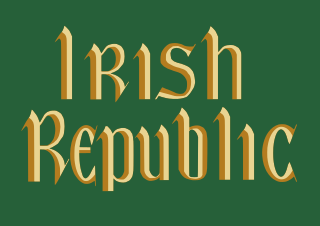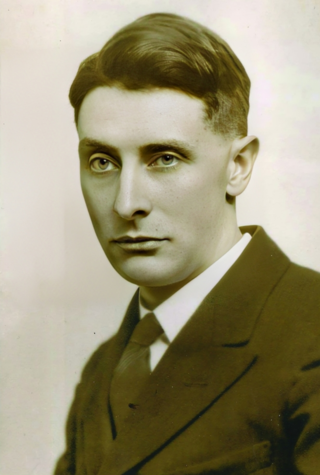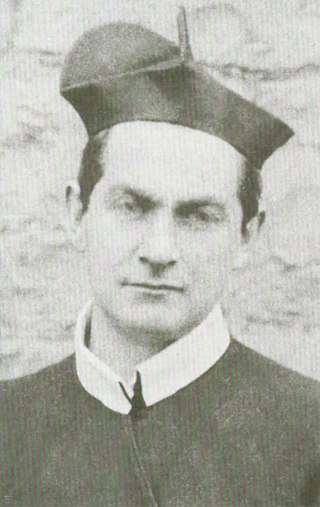Related Research Articles

The Dublin Magazine was an Irish literary journal founded and edited by the poet Seumas O'Sullivan and published in Dublin by "Dublin Publishers, Ltd., 9 Commercial Buildings. London: Elkin Mathews, Cork St. W.1." The last page of the July 1925 issue states the it was printed by Cahill & Co. Ltd. Parkgate Printing Works and published by the proprietors of The Dublin Magazine at 7-9 Commercial Buildings, Dame Street, Dublin.

The Communist Party of Ireland is an all-Ireland Marxist–Leninist communist party, founded in 1933 and re-founded in 1970. It rarely contests elections and has never had electoral success. The party is a member of the International Meeting of Communist and Workers' Parties.

Katharine Tynan was an Irish writer, known mainly for her novels and poetry. After her marriage in 1893 to the Trinity College scholar, writer and barrister Henry Albert Hinkson (1865–1919) she usually wrote under the name Katharine Tynan Hinkson, or variations thereof. Tynan's younger sister Nora Tynan O'Mahony was also a poet and one of her three children, Pamela Hinkson (1900–1982), was also known as a writer. The Katharine Tynan Road in Belgard, Tallaght is named after her.
Events from the year 1986 in Ireland.
Events from the year 1942 in Ireland.
Events from the year 1925 in Ireland.

The history of the Jews in Ireland extends more than a millennium. The Jewish community in Ireland has always been small in numbers in modern history, not exceeding 5,500 since at least 1891, but Jews in Ireland have historically enjoyed a relative tolerance compared to elsewhere in Europe

Michael O'Riordan was the founder of the Communist Party of Ireland (3rd) and also fought with the Connolly Column in the International Brigades during the Spanish Civil War.

Saor Éire was a far-left political organisation in the Irish Free State established in September 1931 by communist-leaning members of the Irish Republican Army, with the backing of the IRA leadership. Notable among its founders was Peadar O'Donnell, former editor of An Phoblacht and a leading far-left figure in the IRA. Saor Éire described itself as "an organisation of workers and working farmers".

Peadar O'Donnell was one of the foremost radicals of 20th-century Ireland. O'Donnell became prominent as an Irish republican, socialist activist, politician and writer.
Doctrine and Life is an Irish religious periodical published by the Dominican religious order. It was initially published from September 1946 as part of the Irish Rosary magazine. From February 1951 it was published as a separate periodical, under its founding editor Fr. Anselm Moynihan. From 1951 to 1961 it was published bimonthly, before becoming a monthly publication in January 1961.

The Republican Congress was an Irish republican political organisation founded in 1934, when pro-communist republicans left the Anti-Treaty Irish Republican Army. The Congress was led by such anti-Treaty veterans as Peadar O'Donnell, Frank Ryan and George Gilmore. In their later phase they were involved with the Communist International and International Brigades paramilitary; the Connolly Column.

The Dominican Order has been present in Ireland since 1224 when the first foundation was established in Dublin, a monastic settlement north of the River Liffey, where the Four Courts is located today. This was quickly followed by Drogheda, Kilkenny (1225), Waterford (1226), Limerick (1227) and Cork (city) (1229). The order was reestablished in the 19th century after having been driven out in the 17th century by laws against Catholic religious orders. During the Penal Laws, as other Irish Colleges were established on the continent, in 1633 the Irish Dominicans established, the College of Corpo Santo, Lisbon and College of the Holy Cross, Louvain (1624-1797) to train clergy for ministering in Ireland. San Clemente al Laterano in Rome, was entrusted to the Irish Dominicans in 1677. In 1855, St. Mary's Priory, Tallaght, was established to train members of the order, who would complete their clerical studies in Rome and be ordained in the Basilica San Clemente.

George Frederick Gilmore was a Protestant Irish republican and communist who became an Irish Republican Army leader during the 1920s and 1930s. During his period of influence, Gilmore attempted to shift the IRA to the political left, but alongside Peadar O'Donnell and Frank Ryan he was expelled for his efforts. After leaving the IRA, Gilmore attempted to unite Irish republicanism under the banner of the Republican Congress, but ideological debates split the group apart. Afterwards, Gilmore removed himself from public life.
The Limerick boycott, also known as the Limerick pogrom, was an economic boycott waged against the small Jewish community in Limerick, Ireland, between 1904 and 1906. It was accompanied by assaults, stone throwing and intimidation, which caused many Jews to leave the city. It was instigated in 1904 by a Redemptorist priest, Father John Creagh. According to a report by the Royal Irish Constabulary, five Jewish families left Limerick "owing directly to the agitation" while another 26 families remained.
Dermot Keogh was an Irish historian. He was Professor of History and Emeritus Jean Monnet Professor of European Integration Studies at University College Cork. Keogh died on 6 September 2023, at the age of 78.

Alive! is a free monthly publication in the style of a newspaper which has been produced since its first edition in 1996 by Alive Group, an organisation with an address at the Dominican Order St Mary's Priory, Tallaght in Dublin, Republic of Ireland. The current editor is a Catholic priest, Fr Brian McKevitt, who refers to the publication as a 'newszine'. While it claims a circulation of 240,000 copies, its actual readership is difficult to establish since a substantial portion of its circulation is delivered door-to-door, with most of the remainder being available through Ireland's network of Catholic churches. It is printed by Datascope, an independent publishing company in Enniscorthy and contains an appeal in each issue for donations totalling €160,000 annually to remain in circulation.

John Creagh, CsSr was an Irish Redemptorist priest. Creagh is best known for, firstly, delivering antisemitic speeches in 1904 responsible for inciting riots against the small Jewish community in Limerick, as well as, secondly, his work as a Catholic missionary in the Kimberley region of Western Australia between 1916 and 1922.
Sir Andrew Ryan was a British diplomat. He was Consul-General to Morocco from 1924 to 1930, Minister to Saudi Arabia from 1930 to 1936, and Consul-General to Albania from 1936 to 1939.
Patrick Finbar Ryan, TC, O.P., (1881-1975) was an Irish Dominican priest who served as Archbishop of Port of Spain, Trinidad (1940–1966).
References
- ↑ Our Story Dominican Publications.
- ↑ 'Irish Newspapers and the Spanish Civil War', Fearghal McGarry, Irish Historical Studies, Vol. 33, No. 129 (May, 2002), Published By: Cambridge University Press
- ↑ Medieval Irish Dominican Studies By Rev Benedict O’Sullivan. In Irish Rosary, vols lii-lvii. 1948–53. Published online by Cambridge University Press: 28 July 2016
- ↑ Blazes Boylan, Skin-the-Goat and Frederick Sweny: the real people of ‘Ulysses’ by Vivien Igoe, Culture, The Irish Times, June 11, 2016.
- ↑ Peadar O'Donnell: socialist writer who was a rebel until the end< History, RTE, November 13, 2020.
- ↑ Keogh, Dermot (1998). Jews in twentieth-century Ireland: refugees, anti-semitism and the Holocaust. Cork, Ireland: Cork University Press. p. 92. ISBN 1-85918-149-X. OCLC 39181606.